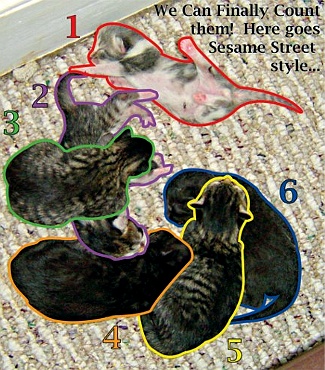Nearly everyone’s seen those books, posters, etc: “How many is a million?” Actually, if you search Amazon for books on a million you’ll come up with a whole bunch on the same theme: trying to express the concept of million to children. It’s sort of a brilliant idea, but I’m not sure how possible it is.
 In my high school world history class, our teacher stressed the significance of the invention of mathematics. Also the concept of zero. Both are extremely important, and probably represent huge moments in human achievement.
In my high school world history class, our teacher stressed the significance of the invention of mathematics. Also the concept of zero. Both are extremely important, and probably represent huge moments in human achievement.
That they are important is inarguable (not true, everything can be debated given enough alcohol time, but never mind), but they’re also sort of inevitable. Simple math, numbers, counting: all came from trade. Business men needed a way to differentiate more from less, to assure that they were getting a reasonably equal worth. The origins of writing can be found in these clerical slips. Symbolic representation does not come from a human need for art or communication. It comes from accounting.
 As significant and important as it is, I can’t help but think it must not have taken a huge leap of genius to start counting apples and oranges (or really probably dates and papayas since we are talking about the cradle of civilization here). You don’t really need the deep philosophy behind math to understand that 5 is more than 4. Babies and animals can identify these basic differences, because the concepts of less and more are far simpler than 4 and 5. Much (most?) of math comes down to this idea. Basic algebra is not that difficult, and honestly has more to do with logic than math. All I’m getting at here is that however much we may have pulled out our hair writing calculus proofs, math as an idea is pretty intuitive.
As significant and important as it is, I can’t help but think it must not have taken a huge leap of genius to start counting apples and oranges (or really probably dates and papayas since we are talking about the cradle of civilization here). You don’t really need the deep philosophy behind math to understand that 5 is more than 4. Babies and animals can identify these basic differences, because the concepts of less and more are far simpler than 4 and 5. Much (most?) of math comes down to this idea. Basic algebra is not that difficult, and honestly has more to do with logic than math. All I’m getting at here is that however much we may have pulled out our hair writing calculus proofs, math as an idea is pretty intuitive.
MATH though is more than numbers. Math is about theories, about twisting common sense, about measuring things that cannot be measured (imaginary numbers anyone?). Physics is a practical application of mathematics, and a theoretical physician can tell you exactly how practical physics is. Engineering is the practical application of physics, and even they come up with some whoopers.
The invention of zero falls firmly in the realms of math as a theory, beyond the tangible. If you’ve never heard of zilch, it’s a bit more of a stretch to conceive of it, but I still don’t think it’s particularly miraculous.
 “0” as a number might be hard to understand, but the concept of zero is pretty simple; it is nothing, it is absence, it has existed and been related to in all of human history because it is death. As I said, the application of zero is a bit more than “do not have” just as 5 is more than apples (dates). At some point though, it is not all that surprising that someone said: “I had five apples. Now I do not have them. Ergo: zero.” (All inventers must say ergo. Or possibly thenceforth.)
“0” as a number might be hard to understand, but the concept of zero is pretty simple; it is nothing, it is absence, it has existed and been related to in all of human history because it is death. As I said, the application of zero is a bit more than “do not have” just as 5 is more than apples (dates). At some point though, it is not all that surprising that someone said: “I had five apples. Now I do not have them. Ergo: zero.” (All inventers must say ergo. Or possibly thenceforth.)
I say this not to understate the hugeness of inventing zero, is is merely to explain how small the understanding of zero is compared to the understanding of million.
 I can have five apples. I can have zero oranges. But I guarantee I will never have a million apples or oranges. Even if I do, if you see what I mean.
I can have five apples. I can have zero oranges. But I guarantee I will never have a million apples or oranges. Even if I do, if you see what I mean.
To talk about millions is as effective as talking about infinity. No matter how long you look at a book with a million ants, or a million cars, or a million people, your brain, or at least MY brain, is incaple of comprehending any more than the trollish concept of “lots.” If you were to show me a photo with an infinite number of marbles (not possible I know) I would think: lots. A billion=lots. Million=lots. 100,000=lots. To be perfectly honest, 500=lots. I’m not sure what the numerical cuttoff is, but I suspect it’s a much lower number than we think. I certainly understand that a million is more than 500, but it ceases to be a question of “how many” and becomes a question of “how big.” The group of ants with a million is bigger than the group with 500, but as far as my brain’s ability to count is concerned, there is NO OTHER DIFFERENCE. I can know that there are more ants in the million group, but it is impossible for me to see it.
1,000,000 is a number, but it’s not a real number. It is absolutely possible for something to exist and not be real. If you want to count the grains of sand on a beach, the answer is not a number, the answer is: It’s sand. The number is sand. How many stars are there? Lots. The number of stars is stars. That is the nature of stars, that they are uncountable. The fact that there are a finite number of sand grains (or stars, though I have no idea if that number is finite) is completely irrelevant because even if a machine counter told you that there were 94,392,347,778 grains of sand, the answer would still be: It’s sand.*
I would guess that it was far easier to invent the number 1 million than the number 0, but there is such a huge difference between knowing and understanding. In these days of unfathomable deficits, idiotic house prices, and rising world population, million has become common as dirt, and is generally shuffled aside for words like billion and even trillion. Ultimately though, they might as well use the same number, because it’s all the same to me.
*The irony here is that in order to explain the concept of infinity, all you can do is compare it to a really big number, while in reality the closest we come to honestly understanding a really big number is infinity, which is actually not all that difficult to understand, and basically comes down to: +1 etc.
**Photos by me, Srqpix Bruno Girin and Sanyam Studios.